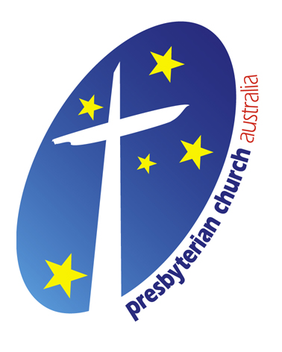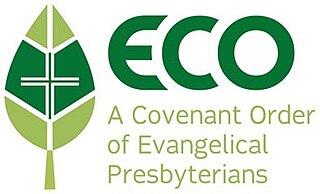Related Research Articles

Calvinism, also called Reformed Christianity, is a major branch of Protestantism that follows the theological tradition and forms of Christian practice set down by John Calvin and various other Reformation-era theologians. It emphasizes the sovereignty of God and the authority of the Bible.
A creed, also known as a confession of faith, a symbol, or a statement of faith, is a statement of the shared beliefs of a community in a form which is structured by subjects which summarize its core tenets.

Presbyterianism is a part of the Reformed tradition within Protestantism that broke from the Roman Catholic Church. Presbyterian churches derive their name from the presbyterian form of church government by representative assemblies of elders. Many Reformed churches are organised this way, but the word Presbyterian, when capitalized, is often applied to churches that trace their roots to the Church of Scotland or to English Dissenter groups that formed during the English Civil War.

The Presbyterian Church in America (PCA) is the second-largest Presbyterian church body, behind the Presbyterian Church (USA), and the largest conservative Calvinist denomination in the United States. The PCA is Reformed in theology and presbyterian in government.

The United Presbyterian Church in the United States of America (UPCUSA) was the largest branch of Presbyterianism in the United States from May 28, 1958, to 1983. It was formed by the union of the Presbyterian Church in the United States of America (PCUSA), often referred to as the "Northern" Presbyterian Church, with the United Presbyterian Church of North America (UPCNA), a smaller church of Covenanter-Seceder tradition at a conference in downtown Pittsburgh, Pennsylvania, in May 1958. Vigorous ecumenical activity on the part of PCUSA leaders led to this merger, something of a reunion of two long-separated branches of the larger Presbyterian family deriving from the British Isles.
The Orthodox Presbyterian Church (OPC) is a confessional Presbyterian denomination located primarily in the United States, with additional congregations in Canada, Bermuda, and Puerto Rico. It was founded by conservative members of the Presbyterian Church in the United States of America (PCUSA), who objected to the rise of Liberal and Modernist theology in the 1930s. The OPC is considered to have had an influence on evangelicalism far beyond its size.

The Non-subscribing Presbyterian Church of Ireland is a non-creedal Christian Church, which maintains a great emphasis on individual conscience in matters of Christian faith.

The Evangelical Presbyterian Church (EPC) is an American church body holding to presbyterian governance and Reformed theology. It is a conservative Calvinist denomination. It is most distinctive for its approach to the way it balances certain liberties across congregations on "non-essential" doctrines, such as egalitarianism in marriage or the ordination of women, alongside an affirmation of core "essential" doctrinal standards.

The Presbyterian Church in the United States of America (PCUSA) was a Presbyterian denomination existing from 1789 to 1958. In that year, the PCUSA merged with the United Presbyterian Church of North America. The new church was named the United Presbyterian Church in the United States of America. It was a predecessor to the contemporary Presbyterian Church (USA).

The Confession of 1967 is a confession of faith of the Presbyterian Church (U.S.A.), abbreviated PC (USA). It was written as a modern statement of the faith for the United Presbyterian Church in the United States of America (UPCUSA), the "northern church", to supplement the Westminster Confession and the other statements of faith in its then new Book of Confessions.

The Presbyterian Church of Australia (PCA), founded in 1901, is the largest Presbyterian denomination in Australia. The larger Uniting Church in Australia incorporated about two-thirds of the PCA in 1977.
The Evangelical Presbyterian Church is a small Australian Reformed Christian denomination. In September 2010 it had five centres: Brisbane; Londonderry (Sydney); Cohuna, Victoria ; Launceston and Winnaleah (Tasmania) with until 2014 a small school at Herrick near Winnaleah.
The Christian Reformed Churches of Australia (CRCA), formerly known as the Reformed Churches of Australia (RCA) is a Christian denomination established in Australia belonging to the Reformed/Presbyterian tradition.

Calvinist confessions of faith are the confessions of faith of various Calvinist churches. These documents express consensus on doctrine for the church adopting the confession. A few confessions are shared as subordinate standards by many denominations, which have made their choices from among the various creeds for primarily historical reasons. Some of the common Calvinist confessions are :

Grace Presbyterian Church of New Zealand (GPCNZ) is a Presbyterian denomination in New Zealand which was formed in 2002. It currently consists of 21 churches and missions, which are in the process of becoming fully established churches.

The Protestant Reformed Churches in America is a Protestant denomination of 33 churches and over 8,000 members.

The Westminster Presbyterian Church is a small but growing Presbyterian denomination in Australia. It is based in Western Australia, New South Wales and Queensland, and has one congregation in the Australian Capital Territory.

ECO: A Covenant Order of Evangelical Presbyterians is an evangelical Presbyterian denomination in the United States. As a Presbyterian church, ECO adheres to Reformed theology and Presbyterian polity. It was established in 2012 by former congregations and members of the Presbyterian Church (USA), abbreviated PC(USA). Denominational disputes over theology—particularly ordination of practicing homosexuals as pastors and gay marriage—and bureaucracy led to the founding of ECO. In 2018, ECO has over 383 congregations, 103,425 covenant partners and over 500 pastors. ECO churches are egalitarian in beliefs and ordain women as pastors and elders.

Presbyterianism has had a presence in the United States since colonial times and has exerted an important influence over broader American religion and culture.
References
- ↑ "Local Churches".
- 1 2 3 "Who Are We?".
- ↑ Presbyterian Reformed Church of Australia at reformiert online